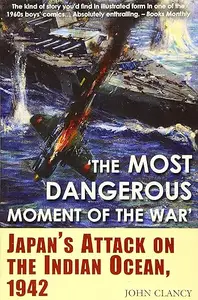
Free Download John Clancy, ""The Most Dangerous Moment of the War": Japan's Attack on the Indian Ocean, 1942"
English | 2015 | ISBN: 1612005330, 1612003346 | EPUB | pages: 208 | 1.0 mb
In early April 1942, a little-known episode of World War II took place, said by Sir Winston Churchill to be "the most dangerous moment of the war," when the Japanese made their only major offensive westwards into the Indian Ocean. Historian Sir Arthur Bryant said, "A Japanese naval victory in April 1942 would have given Japan total control of the Indian Ocean, isolated the Middle East and brought down the Churchill government."
War in the Far East had erupted with the attack on Pearl Harbor on December 7, 1941, followed in succession by Japanese drives on the Philippines, Indochina, the Java Sea and Singapore. Seemingly unstoppable, the Japanese now had a vast new empire, and having crippled the American fleet at Pearl Harbor, turned their sights on the British Eastern Fleet based at Ceylon. Occupation of Ceylon (now Sri Lanka) would not only provide the Japanese a springboard into India but control of the essential convoy routes to Europe and the Western Desert. And aside from the British Eastern Fleet, the Indian Ocean lay undefended.
So far the Japanese had suffered no significant losses and the question on everyone's lips was how soon the enemy would appear off India. In April 1942 a Japanese fleet led by six aircraft carriers, four battleships and 30 other ships sailed into the Bay of Bengal. After the war, Churchill said that potential disaster was averted by the actions of one pilot, Squadron Leader L.J. Birchall, who in his Catalina flying boat spotted the Japanese warships massing some 350 miles from Ceylon. He was shot down by a Japanese Zero but not before sending a brief radio message back to his base. This gave the island's defense forces time to prepare.
In the ferocious battles that followed, the British lost a carrier, two heavy cruisers and many other ships; however, the Japanese eventually turned back, never to sail against India again. John Clancy, whose father survived the sinking of HMS Cornwall during the battle, tells the story of this dramatic but little known campaign in which a major Allied catastrophe was only narrowly averted.
Table of Contents
Acknowledgements
Introduction
1 The Background to the Conflict
2 The Allied Response
3 Political Divisions as Ceylon Prepares
4 The Events of Easter 1942
5 The Loss of the Cornwall, the Dorsetshire and Other Ships
6 Survivors' Stories
7 Nagumo Follows up with Trincomalee and More Ships are Sunk
8 The Sequel and its Aftermath
9 Victory or Defeat?
A Poem by Emlyn Parry, a former seaman of HMS Dorsetshire
Further Reading
Index
Code:
Bitte
Anmelden
oder
Registrieren
um Code Inhalt zu sehen!